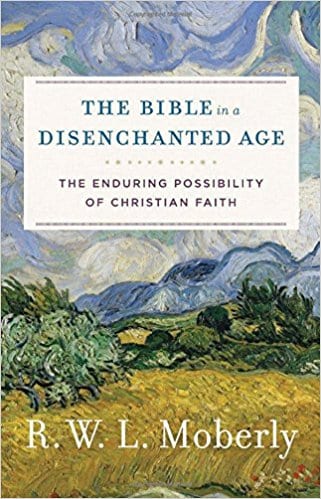
In this thoughtful short book, Prof. Moberly engages the matter of how to communicate the uniqueness of the Bible in a postmodern age. Put another way, while some have argued that we ought to read the Bible “like any other book” (using historical critical methods), Moberly makes a case for also reading the Bible as something special: “On what grounds, if any, is it appropriate to privilege the Bible and the biblical account of God in the world today?” (40). Moberly does not go the way of traditional apologetics – arguing that the Bible has objective authority because of its historicity.
He begins by debunking the notion that Christians are illogical or odd for privileging the Bible. Moberly argues that everyone privileges some lens or perspective for thinking about the world and the meaning of life. Christians happen to focus their lens on Jesus and the Bible. Moberly also appeals to the notion of “Plausibility Structures.” By this he means, “the idea that the social and cultural context within which people live regularly make a difference to the understandings of life that they hold to be true; among other things, to be surrounded by a consensus can encourage people to adopt that consensus for themselves” (93). I think this is Moberly’s way of saying that people will come to be convinced of the Bible’s unique perspective when they see a compelling, winsome, and special life of a special community that lives according to the Bible. I think he pretty much states this much: “the biblical portrayal of human nature and destiny will present itself to consciousness as reality only to the extent that its appropriate plausibility structure, the Christian church in its many forms, is kept in existence” (101). Thus Moberly can talk about the “complementary nature of Bible and church” (102).
There is more in the book, but this appears to be the main contribution. Overall, I am sympathetic to Moberly’s argument, and indeed in a postmodern and pluralistic era this is a wise approach to commending the Bible as revelation. Still, I am not as sour on the possibility of traditional historical arguments that this historical figure called Jesus did and said some amazing things that we must consider.
On a personal note, I also want to mention that, historically, Christian advocacy of the message and lifestyle of Scripture has focused on sin and salvation. Moberly is not denying this, but neither sin nor salvation is given much attention directly in this work. That is not unexpected in this kind of discourse, but I will say that in my personal story, the Bible’s pointing out of my sin, and promise of grace was a powerful message, and a message I did not hear anywhere else. Yes of course I was brought into a community of faith (a “plausibility structure”), but my direct encounter with the text, and with God through the text, was life-changing.
The Bible in a Disenchanted Age demonstrates Moberly’s mature thought and exquisite writing style. It is not easy reading, but it is richly rewarding.











